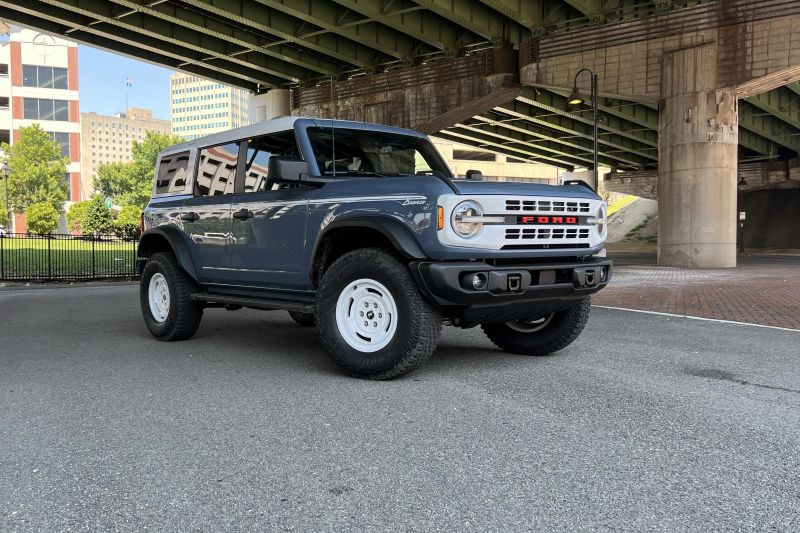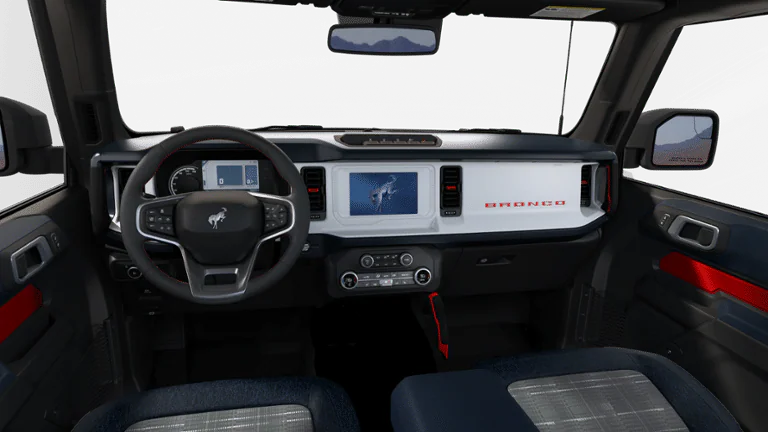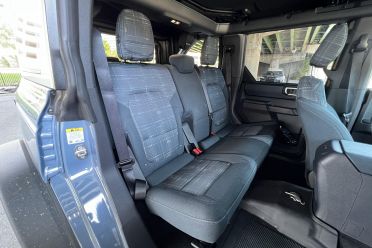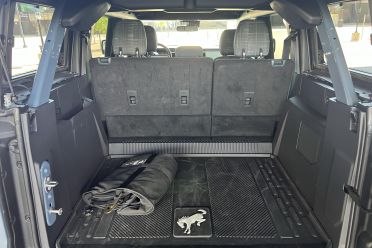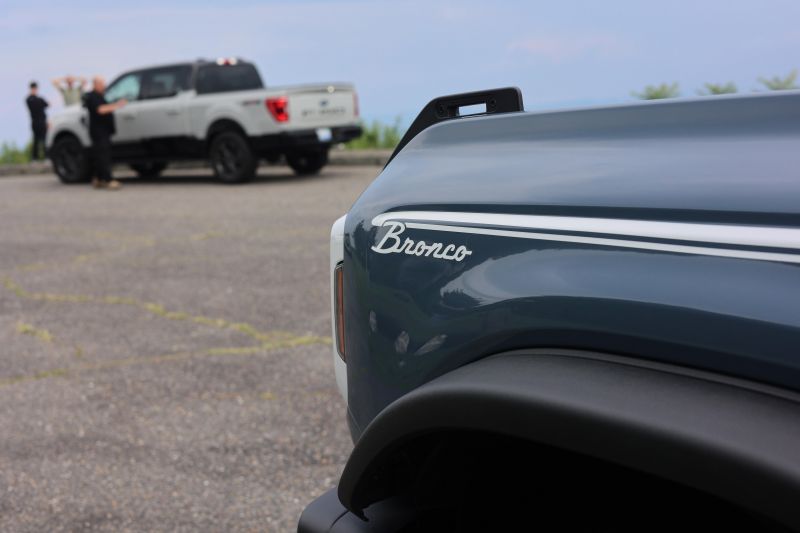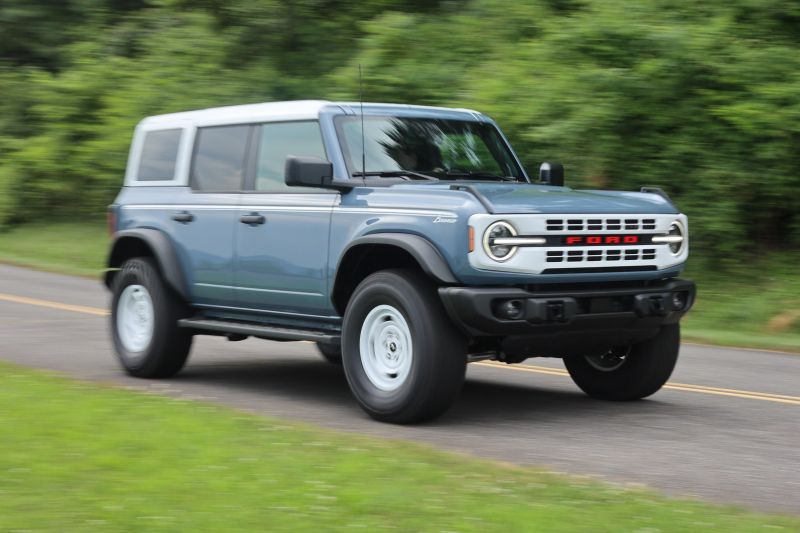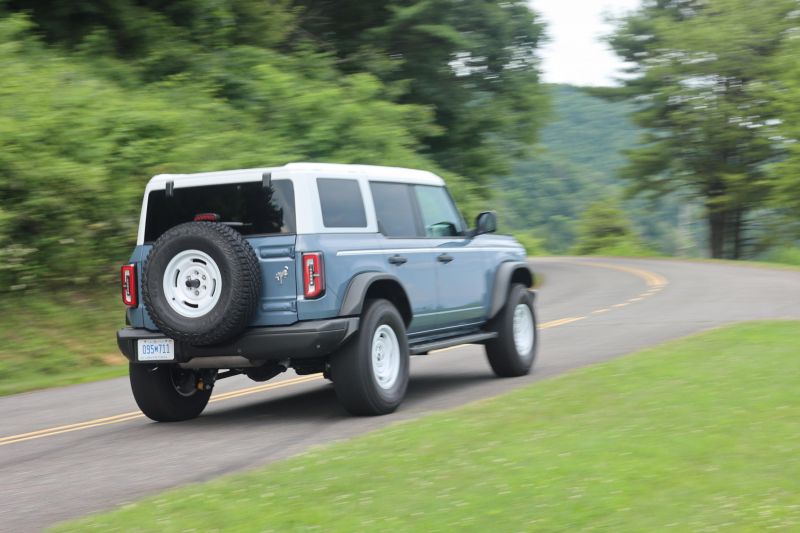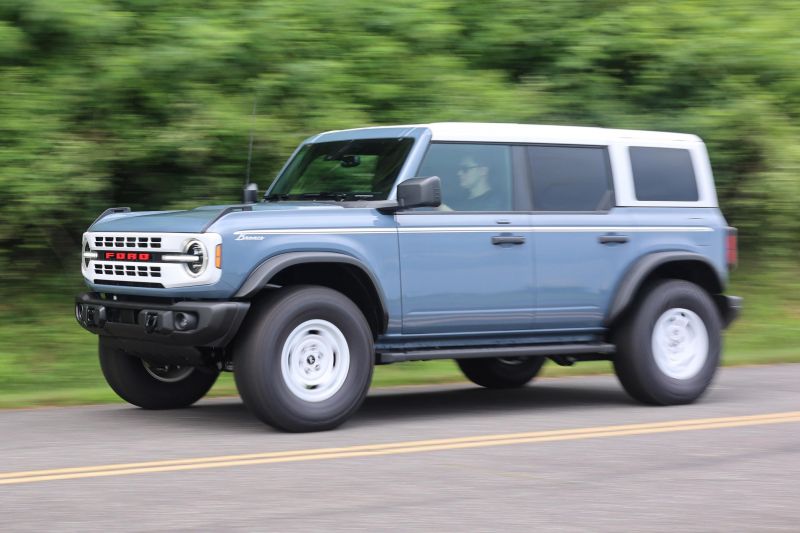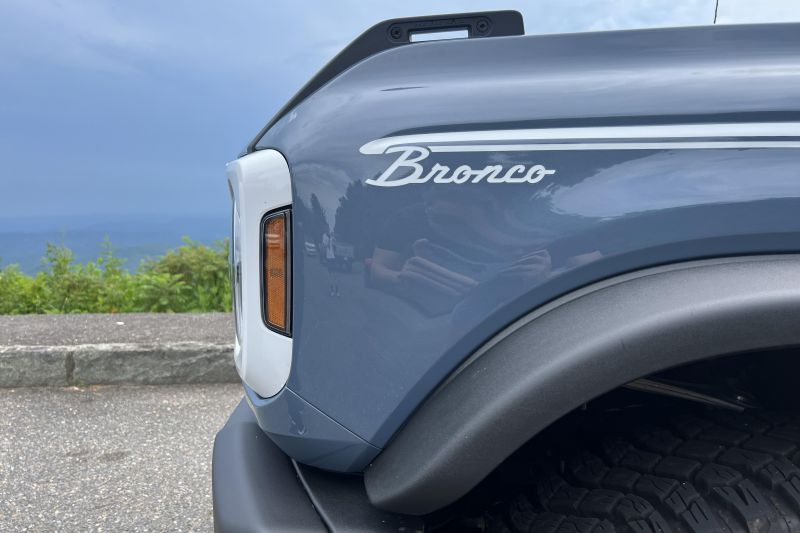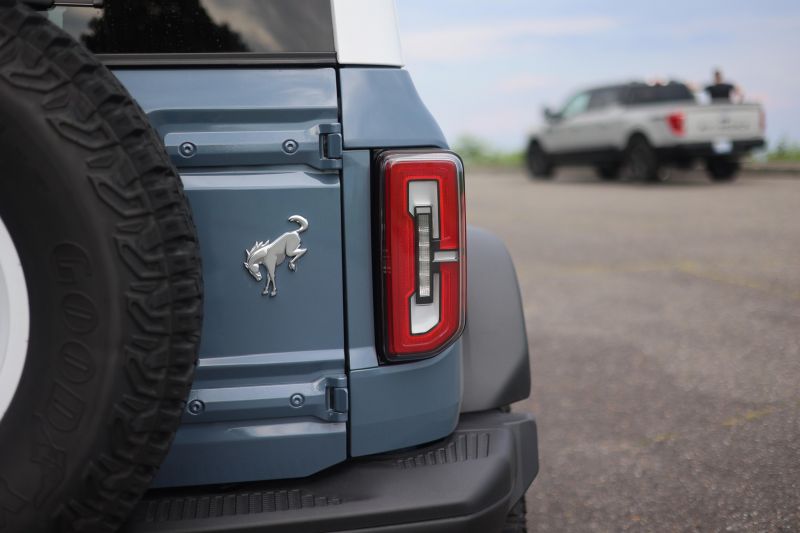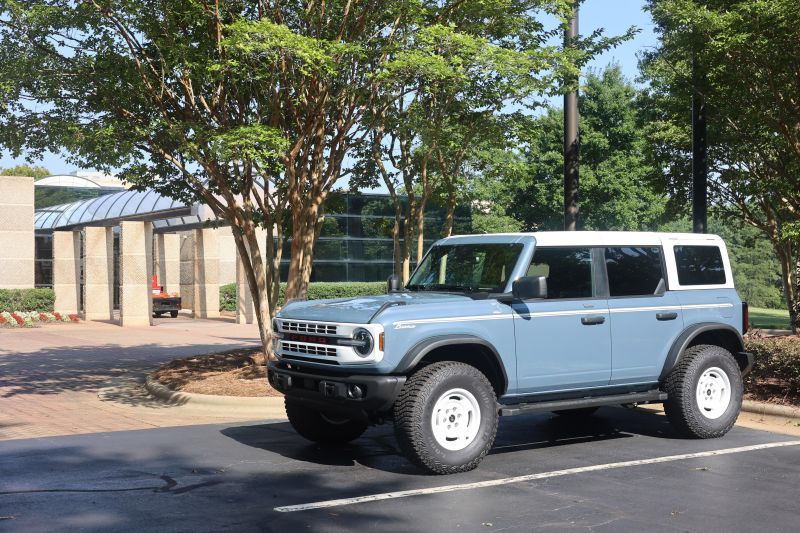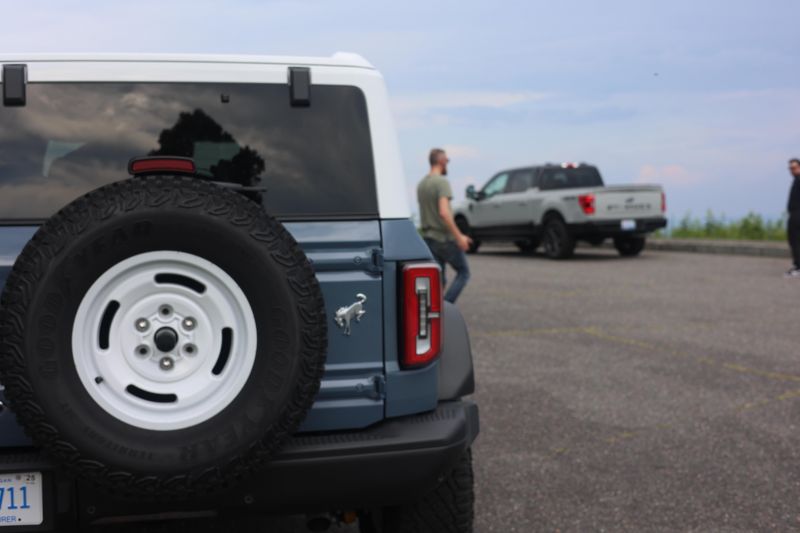The Jeep Wrangler has had things its own way for far too long.
Save for the Mahindra Thar, which has been struck down by lawsuits in Australia anyway, proper competitors for the legendary Jeep have been hard to come by for a while now.
That’s where the Ford Bronco comes in.
Revived in 2020, it’s a retro-looking off-roader just like the Jeep… but one that’s designed on the same bones as our Ford Ranger, which means it shouldn’t handle like a relic.
We hopped behind the wheel of a very cool, very retro Bronco Heritage Edition in the USA to see how it stacks up.
How much does the Ford Bronco cost?
Pricing for the Bronco kicks off at US$34,890 (A$52,750) before on-road costs for the Base, and stretches to US$86,580 (A$132,000) before on-roads for the Raptor.
Our Heritage Edition tester had a sticker price of US$47,105 (A$71,600).
In Australia, the only real rival for the Bronco is the Jeep Wrangler. It starts at $81,450 before on-roads, and extends to $90,450 before on-roads.
What is the Ford Bronco like on the inside?
You don’t hop into a Bronco, you step up into it. Riding on the 35-inch tyres standard as part of the Sasquatch Pack fitted to our tester, the Bronco is a mini monster truck.
The retro theme from the exterior carries over behind the wheel, where there’s white trim, red lettering, and a funky finish for the cloth-trimmed seats.
Beyond the classic trim, the design borrows more than a bit from the latest Land Rover Defender with its prominent crossbeam on the dashboard, complete with BRONCO stamping, but we won’t hold that against Ford. We also won’t hold the fact it’s a bit cheaper than a Defender inside against Ford, given the Bronco fights at a very different price point.
Front occupants sit nice and high, and there’s plenty of adjustment for taller drivers to get comfortable. It’s more accommodating than a Wrangler, and there’s still space for a footrest in the manual car’s footwell.
Facing the driver is a combination analogue/digital instrument binnacle, complete with retro fonts to match the rest of the car. It’s easy to read at a glance, although it’s not quite as flash as the fully digital unit offered in high-end versions of the Ranger and F-150.
Our tester featured an 8.0-inch touchscreen infotainment system in the middle of the dashboard. There’s space for a bigger display, but it’s reserved for higher-end models in the range.
Although it looks a bit small in the dashboard, the SYNC infotainment system is quick and easy to use, and features wireless smartphone mirroring for anyone looking to sidestep the factory technology.
Storage is plentiful up front, with generous cupholders on the transmission tunnel, a space beneath the dashboard for phones, and netted pockets in the doors. Like a Wrangler, the doors are removable – which means the window and mirror controls are central, rather than in the doors.
Rear seat space is surprisingly good. The door openings are wider than in a Wrangler, making it easier to clamber in, and at six-seven I was able to sit comfortably behind another adult. There’s plenty of toe room, and solid legroom back there.
The lack of rear air vents isn’t ideal for kids, but the dual USB ports are welcome.
Claimed boot space is 471 litres with the rear seats in place. Access comes courtesy of a side-hinged tailgate – you open the barn door then the glass to get in, and do the opposite to close it.
What’s under the bonnet?
Power in our Bronco tester came from a 2.3-litre EcoBoost turbocharged four-cylinder petrol engine making 224kW and 440Nm.
It’s mated to a four-wheel drive system capable of running in 2H, 4A for all-wheel drive on sealed surfaces, 4H, and 4L. Locking front and rear differentials are on hand as well.
Our tester featured the seven-speed manual transmission; unlike a seven-speed 911, the Bronco has six regular forward ratios for driving on the road, and the seventh is a special “crawler” gear that’s significantly shorter than first for off-road rock crawling.
It’s accessed by lifting the collar you’d usually use to get to reverse, so you won’t accidentally put the car in C instead of second. Claimed fuel economy is 17 US MPG (13.8L/100km), we matched that on a road trip with plenty of stops for filming and sightseeing. In other words, that figure may be achievable.
A 2.7-litre EcoBoost V6 is offered, making 246kW and 562Nm. It’s mated with a 10-speed automatic transmission, as is the 3.0-litre V6 in the Bronco Raptor. The range-topping Raptor pumps out 312kW and 597Nm, up even on what we get in the Ranger Raptor with the same engine in Australia.
How does the Ford Bronco drive?
The Bronco shows longer-running body-on-frame off-roaders how things should be done in a few key ways.
The levels of refinement – both when it comes to how it drives and how Ford has kept noise at bay – put the Wrangler in the shade on-road, and not by a small margin.
With a light clutch and pretty effortless shift, it’s no great hassle to drive in heavy traffic. The EcoBoost engine does have some lag, so you need to work the shifter to keep it in its torque band when you’re moving, but that’s no great hardship.
You could argue it’s part of the appeal, given this is an old-school off-roader that’s been dragged into 2023.
Put your foot down and the 2.3-litre engine offers a decent shove in the back. With four adults and luggage on board it needs to be worked reasonably hard, but even with the accelerator buried it’s pretty refined inside.
The engine never raises its voice, and road noise from the monster 35-inch off-road tyres fitted to our tester is pretty well suppressed.
With that said, the boxy body, removable windows and doors, and oversized rolling stock all come at a cost. You still get plenty of road roar from the all-terrain tyres at 120km/h on American interstates, and the wind rush around the doors and roof seals is noticeable.
You’re still able to comfortably have a conversation between the front and rear seats, but it’s not nearly as quiet as an Everest or Ranger at the same speeds. The price of fashion, right?
Although it’s a bit breezy, the Bronco is surprisingly nice to drive on the highway.
The steering feels solid on centre, and the car is nice and planted on cambered roads. Rather than wandering around and requiring constant inputs from the driver like a Wrangler, it settles down confidently at a cruise.
The lack of adaptive cruise control in the manual is a miss, but the lane-keeping assist worked effectively on the interstate.
It was less effective on rural roads, where mottled light and less defined road markings make like hard for the car’s cameras.
What do you get?
Bronco Heritage Edition highlights:
- Exterior
- Fender tie-down hooks
- 17-inch white alloy wheels
- Azure Grey tri-coat paint finish
- LED headlights and tail lights
- Removable hard top with extra sound insulation
- Interior
- Cloth seats with heritage print
- Leather steering wheel and gear knob
- 8.0-inch touchscreen infotainment system
- Apple CarPlay and Android Auto (wired/wireless)
- 4x USB points (2x A, 2x C)
- Dual-zone climate control
Is the Ford Bronco safe?
The Bronco isn’t offered in Europe or Australia, and therefore hasn’t been crash tested by ANCAP or Euro NCAP.
Although the Ranger with which it shares a chunk of its underpinnings is a five-star car, the Bronco is structurally very different thanks to its removable roof and doors.
Standard safety equipment includes:
- 6 airbags
- Autonomous emergency braking (AEB)
- Rear cross-traffic alert
- Blind-spot monitoring
- Lane-keeping assist
- Auto high-beam
How much does the Ford Bronco cost to run?
Ford backs its range in Australia with a five-year, unlimited-kilometre warranty.
Service pricing isn’t relevant, as the Bronco isn’t sold in Australia.
CarExpert’s Take on the Ford Bronco
It’s a damn shame the Bronco still isn’t coming to Australia.
It wouldn’t sell in the same numbers as the Ranger or Everest, but Jeep sells between 1000 and 2000 examples of the Wrangler every year – and the Bronco is a better all-rounder than the Wrangler, based on our road drive.
Beyond the Mustang and the Ranger, the Blue Oval has struggled to generate excitement around its range in Australia since the death of the Falcon. This could be the perfect solution to that problem – we only experienced the least powerful variant, too.
The base EcoBoost engine has enough get up and go, but adding more grunt from the 2.7-litre EcoBoost – or the Bronco Raptor with its 3.0-litre V6 – would no doubt improve the appeal further, given how much Australians love fast cars and SUVs.
Come on Ford. The Bronco started life in Australia, it’s time to bring it home.
Click the images for the full gallery
MORE: Everything Ford Bronco

